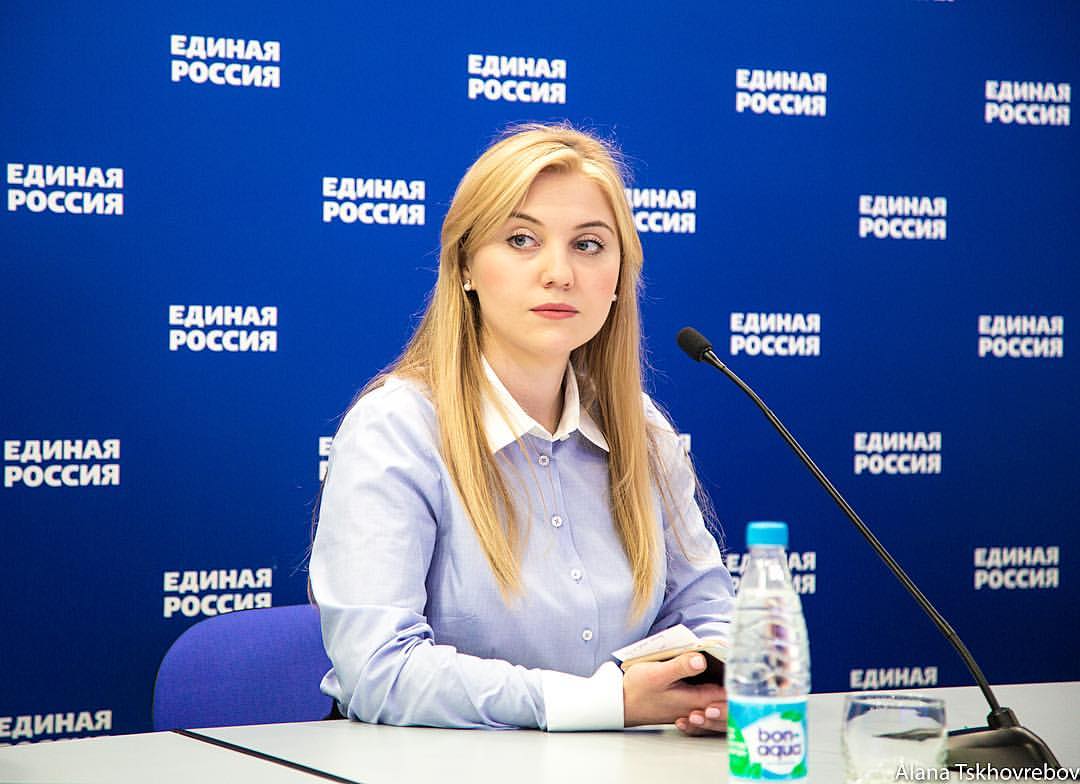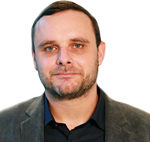‘Putin represents a symbol of stability for the people’
Daria Sharova is the International Secretary of the “Molodaja Gwardija” – the “Young Guard” – which is the youth organization of the United Russia party. She spoke with FreeWestMedia about the difficulties and expectations in relations with the European Union.
Published: April 2, 2017, 8:39 pm
Mrs. Sharova, you are the international secretary of the “Molodaja Gwardija” (“Young Guard of United Russia”). In times of Western Russophobia, sanctions and hysteria, it doesn’t sound like an easy job at all. How are your relations with European youth organizations?
Sharova: All kinds of international relations in difficult times are not an easy job, but we try to keep our relationships with our friends. And new times bring new people. We have many more new organizations who are against this hysteria and are very close friends of us now.
The majority of the socialist, liberal and conservative parties in the EU are supporting the anti-Russian politics. Are you in contact with their Youth Organizations? And if yes – how are they thinking about the political course of their parties?
Sharova: When we talk about youth politics we have to take into account that our younger generations don’t have the prejudices that we used to have in the past. The conservative and classical liberal parties in Western Europe — most of them — were already active in Soviet times. The path towards their Transatlanticism created tensions with the communist parties in the East and with the Soviet Union too since they were closer to US policies. Nowadays Russia is not communist anymore, and also the youth branches in Western Europe and in the European Union are better able to establish cooperation with us in Russia and in the post-Soviet countries. I know many of my political colleagues who will be attending the next World Festival of Youth and Students in Sochi in October, also coming from time to time to Russia to attend events and such signals are a proof of the new attitude between youth partners. Regarding how they see their own mother parties, there is not a clear position. It depends, since we are talking about almost 50 different European and Eurasian countries, and some Middle East parties. Some are more critical and some others follow the party discipline and positions. From my own experience in our last common events I see a tendency of being more open-minded regarding modern Russia, giving more respect to our institutions and a wish to cooperate on topics such as anti-terrorist policy, trade, mobility, university exchange and cultural engagement.
The present Europe is dealing with a lot of problems — most of them caused by the recent governments: open-borders politics and mass migration, social tensions, financial crises. To many Europeans the Russian Federation and its president seem like a “stable, solid column” compared to the European chaos. How do you think about that?
Sharova: I think it is one of the reasons why president Putin is so popular nowadays. According to the last polls his rating of support is 82,56 percent. If we remember Russia in the 1990s — it was a disaster. There was chaos in all spheres. President Putin represents for the people a symbol of stability within the system. People can plan their lives: marry, have babies, buy property. People can have a future. A future with peace.
Euroskeptic movements are on the rise in Europe. Most of them — beside some exceptions — have a pro-continentalist and pro-Russian political stance. They are against the politics of confrontation with Moscow. How are these Euroskeptic forces seen in Russia generally?
Sharova: The European Union witnesses difficult times nowadays: economic and political crises, Brexit and so on. We see all of this in our media, on the internet, in social networks. And it is also difficult for European society to be separated into different parts. Our minister of foreign offers, Sergey Lavrov, always says that we are open for dialogue. Dialogue is only one way of finding solutions and of finding new common policies. And it is great that we have people in Europe who agree with this way of thinking.
How do you see the Euroskeptic organizations and parties in Europe? Are they rather a risk or a chance for future Russian-European relations?
Sharova: Let’s start saying most of them claim to represent a Eurorealist view of Europe. They believe in a Europe where the Nation-States cooperate with each other on fundamental policies, coordinate their different interests and achieve common goals together like peaceful coexistence, strong security, clear borders and a single market where people can trade freely. There are two different groups in the European Parliament: the ENF led by the French Front National and other patriotic movements from the Netherlands, Germany, Italy and Austria. And another group lea by Nigel Farrage. Such groups are more open to cooperate with Moscow, as the others do with Washington. It doesn’t mean their main policy is to get closer to Russia, but it is an attractive option for many of them. So the chance is there since our historical partners have become less interested in having good relations with us. I think it is only a matter of time before relations with the EU will normalize again. There are symbolic pictures making us more optimistic: Mr. Pedro Agramunt, the Chairman of PACE (Parliamentary Assembly of the Council of Europe) met Mr. Vyacheslav Volodin twice in Moscow in the last months. The same happened with OSCE Chairman Sebastian Kurz, the Minister of Foreign Affairs of Austria, some delegations from the French Parliament and Senate came to have meetings in our parliament as well. Also the former French President Nicolas Sarkozy, current President of the European Commission Jean-Claude Juncker and former PM of Italy Matteo Renzi attended the Saint Petersburg Economic Forum last year, saying dialogue with the Russian Federation is very important. So as we see, there have been positive signals in the last months and we have to also open our arms to those Europeans who want to have good relations with us.
All rights reserved. You have permission to quote freely from the articles provided that the source (www.freewestmedia.com) is given. Photos may not be used without our consent.
Consider donating to support our work
Help us to produce more articles like this. FreeWestMedia is depending on donations from our readers to keep going. With your help, we expose the mainstream fake news agenda.
Keep your language polite. Readers from many different countries visit and contribute to Free West Media and we must therefore obey the rules in, for example, Germany. Illegal content will be deleted.
If you have been approved to post comments without preview from FWM, you are responsible for violations of any law. This means that FWM may be forced to cooperate with authorities in a possible crime investigation.
If your comments are subject to preview by FWM, please be patient. We continually review comments but depending on the time of day it can take up to several hours before your comment is reviewed.
We reserve the right to delete comments that are offensive, contain slander or foul language, or are irrelevant to the discussion.

Swedish military wants to remilitarize the Åland Islands
The demilitarized autonomy has previously been known as 'the islands of peace.

NOAA Predicts Zero Sunspots for Almost the Whole 2030s
CLIMATEThe United States' government scientific organization, the National Oceanic and Atmospheric Administration (NOAA), predicts zero sunspots from 2031 to 2040. This is an extreme situation that has not occurred in as long as humanity has been counting sunspots, and it leads us into uncharted territory in terms of our solar system. However, this prediction aligns with the warnings of the world-renowned solar researcher Valentina Zharkova for many years, who indicated in 2019 various signs of this catastrophic phenomenon, including the extreme hailstorms we have seen in Europe and the world this summer. The forecast and various observations this year give cause for very significant concern. In this unique analysis, Free West Media explains why.

European Nationalist Parties Forge Cooperation Ahead of EU Elections
EUROPEAN ELECTIONSOn Saturday, August 26, representatives of six European nationalist parties gathered in Budapest. The meeting was initiated by the Hungarian party Mi Hazánk and took place in the national parliament. Representatives of the parties signed a joint declaration that not only reaffirms the parties' friendship but also their unity on a range of complex political issues. A surprisingly clear and radical manifesto was established. The hope is that this cooperation will lead to success in the EU elections and eventually result in the formation of a group in the European Parliament. For Swedish nationalism, this meeting marks a success as Sweden, for the first time, has a party represented in a leading nationalist cooperation in Europe. Free West Media was present at this historic event.

Turkey Believes Sweden Hasn’t Done Enough
Sweden will have to wait a bit longer for NATO membership, according to Turkey's Justice Minister Jilmaz Tunc. First, Sweden must extradite the "terrorists" Turkey wants and stop the desecration of the Quran.

Swedish Weapon Takes Down Russia’s Best Attack Helicopter
The Russian attack helicopter Ka-52 is considered one of the world's best and has struck fear in Ukraine, where it has hunted down tanks and other armored vehicles, often beyond the range of many light anti-aircraft systems. However, it has met its match in the Swedish air defense missile system RBS 70, which has quickly led to significant losses for the Russian helicopter forces.

Strong Confidence in German AfD
Alternative for Germany (AfD) held a party conference on July 29-30 to select candidates for the upcoming EU election next year. EU Parliament member Maximilian Krah, belonging to the party's more radical, ethnonationalist faction, was appointed as the top candidate. The party's two spokespersons delivered powerful speeches criticizing the EU's failed migration policy and trade sanctions that isolate Europe and Germany from the rest of the world. They argued that it's time for the EU to return a significant portion of its power to national parliaments. However, they have dropped the demand for Germany to exit the EU.

The Establishment Wants to Ban Germany’s Second Largest Party – for the Sake of Democracy
The rising popularity of AfD has raised strong concerns within the establishment. Despite lies and demonization in the media and isolation from the overall political establishment, the party continues to grow. Certain representatives of the party are accused of becoming increasingly "extreme," and in an unusual move, the influential weekly newspaper Der Spiegel demanded that AfD be "banned."

Dutch FvD break through the media blockade
What is happening in the Netherlands? It is often difficult to follow events in other countries, especially when distorted by system media. We give Forum for Democracy (FvD) the opportunity to speak out on the political situation in the Netherlands and the staunch resistance they face in trying to save the country.

The Ursula von der Leyen Affair
After a criminal complaint in Belgium against the President of the European Commission, the so-called SMS-case, now takes a new turn. The judge responsible for the investigation will likely gain access to the secret messages exchanged between Ursula von der Leyen and Albert Bourla, CEO of Pfizer, at least if they haven't been deleted.

Publisher of Unique Literature Worldwide Blocked by International Distributor
Arktos has distinguished itself by publishing groundbreaking philosophers and social critics. Now, the publisher's international distributor has abruptly terminated the cooperation, and more than 400 already printed titles cannot reach their audience. There is strong evidence that the distributor has been under pressure, something that has also happened in Sweden. We have spoken with Arktos founder Daniel Friberg about the ongoing struggle for freedom of speech in a shrinking cultural corridor.


